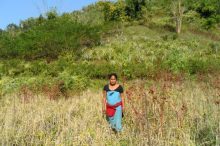
Assam, India – Growing crops is a challenge in the hilly terrain of Assam-India. To counter this, Sloping Agriculture and Land Technology (SALT) has been introduced as an alternative farming method to the farmers in place of jhum. Farmers are trained on – A-frame or making the contour line by using the A-frame; and planting Nitrogen Fixing Trees (NFT) as hedge rows in the contour line. These NFTs act as barriers to prevent the soil from eroding and at the same time to increase soil fertility. In between the rows, the farmers cultivate other crops ranging from permanent, semi-permanent to seasonal crops depending on the farmers. Farmers are motivated to adopt the SALT method as it is simple, easy, and affordable.
Simultaneously, farmers are also trained on livestock rearing such as piggery in the SALT farm as the pig dung can double up as fertilizer for the SALT farm.

One of the recipients of this training is Dibi Boro from Umjarha village of Jirang Block in the Ri-Bhoi district. Dibi is a poor farmer working on a small plot of about one-acre land given to her by her parents at the time of her marriage.
Partner farmer organization at Meghalaya provided training in SALT, SRI, Kitchen Gardening, Livestock, Water Harvesting, Composting, etc. to Dibi.
Dibi then commenced SALT farming after observing the benefits which practicing this new technology brought to her peer farmers. She planted NFTs as contour lines and fruits like pineapples, oranges, and litchi. She also started rearing pigs in her SALT farm as their dung could be later put to use as compost for the fruits, plants, and crops. Thanks to SALT Farming Dibi has had a rich and healthy fruit yield from her farm since then. #

About MTCP2
The Medium-Term Cooperation Program Phase 2 (MTCP2), a five-year capacity building program supported by the International Fund for Agricultural Development (IFAD), the Swiss Agency for Development and Cooperation (SDC), and the European Union (EU), has been implemented in 19 countries across three sub-regions—Southeast Asia, South Asia, and the Pacific—engaging 1,544 sub-national farmers organizations (FOs) with a total membership of around 22 million farmers. The funding support (total budget of $ 5 million for the whole duration of the project across 19 countries) serves as a catalytic fund that will allow FOs to enhance their capacity to be effective channels of economic services to farmers. The program has contributed to the formation of the strong national platform of FOs with improved capacity to engage in policy processes and mobilize resources from mainstream agricultural development programs like extension services, credit, and pre and post-harvest facilities. The program also helped in transforming farmers’ associations into commodity-based cooperatives to strengthen the role of small-scale farmers within an inclusive and sustainable value-chain. The program is being implemented by the consortium Asian Farmers’ Association for Sustainable Rural Development (AFA) and La Via Campesina (LVC).

Comments are closed